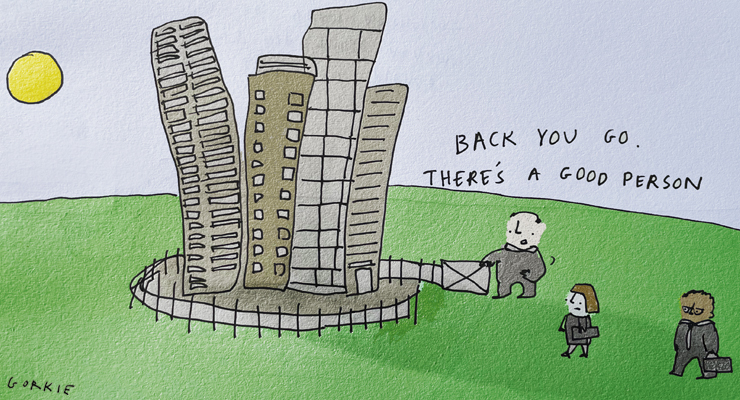
How’s this for a novel approach to industry policy?
Acme Products is unhappy that a lot of people who used to buy at Acme are now buying at Ajax Products, which is located in a different part of town. So Acme gets some lobbyists to approach the government to ask that the government force people to travel to where it is located — and force them to pay the cost of that travel — so that more people will buy Acme instead of Ajax.
Better yet, they get friendly journalists to write up stories about how terrible it is that people aren’t coming to Acme anymore, and why they should be forced to.
You might think Acme would get ridiculed for its demands. But in Australia, where state capture and influence-peddling are standard features of public policy, it gets taken seriously.
In today’s Sydney Morning Herald, under a headline “City businesses face ‘financial ruin’ unless workers return to CBD”, Acme — aka Business Sydney, independent state MP Alex Greenwich, and a hairdresser who thinks people not coming to his salon are “being lazy” — gets an entire article to call for the state government to force public servants to return to their offices and to hand out taxpayer-funded vouchers to encourage people to spend in the Sydney CBD.
(At the same time, the Victorian government is ending its working from home rules, with Victorian businesses claiming it will be a big boost for “business precincts”).
What’s bizarre about the demands to force “lazy” workers back to the office, where they can presumably pop up for a cut and blow-dry at lunchtime, is that, nationally, retail sales to July have grown strongly compared to 2021 — by 16.5%. Much of that is inflation, true, but it’s also occurred despite the Reserve Bank hiking rates multiple times. And NSW retail sales have grown at a significantly higher clip than nationally (as they have in Victoria).
But isn’t that persistent strength in retail sales all just people ordering online and not going out while they “laze” at home working from under the doona? Well, café and restaurant turnover has grown by more than 21% since January (and by 5% since May when the RBA began hiking rates). It seems that for every small café struggling with foot traffic, there must be another one going gangbusters.
That is, the overall level of spending in the economy remains buoyant — too buoyant, monetary policy hawks would insist. There is no sign whatsoever that people working from home — which is now, whether the Property Council and Business Sydney like it or not, a permanent feature of employment — is affecting overall demand. What’s happening is spending is occurring outside CBDs, in local shops and online. They’re spending more where they live, compared to where they work, or they’re spending on the internet.
So Ajax is doing well.
Ajax wouldn’t do so well if Acme had its way and the state government forced every public service to return to work and handed out free money for people to spend in CBD shops. That would transfer sales from Ajax to Acme. But Ajax isn’t as well organised as Acme. There’s no chamber of suburban businesses that can get its calls returned by ministers like Business Sydney can. There’s no lobby group for local cafes where you do a mid-morning coffee run on your work-from-home day.
But you can’t blame Acme for trying. We know that rent-seeking and influence-peddling are hallmarks of the way Australian business conducts itself. And to the louder and the more powerful, usually, go the spoils.








I closed our WA state office in 2008. Everyone works from home. We have staff meetings in cafes (rotating choice).
All our office was was desks, phones and an internet connection. That’s everywhere now.
If someone wants to take a laptop and a phone to the beach for the day….I couldn’t care less as long as the work gets done.
Are your employees covered by Work cover whilst driving to or at the beach ?
A brilliant, and chilling, analysis, Bernard. Actually, having had it summarised succinctly would enable blind Freddy to see the Covid inspired changes to work practice. Actually cheaper and more from client for everyone…..
In our small local shopping centre, a new cafe opened one week before the first lockdown started. It’s been going gang-busters ever since.
Any thought also being given to the savings on emissions from people not have to commute, or is it cancelled by people running their heaters/air conditioners individually at home rather than in a shared building?
The ongoing chatter from business groups & their friendly media buds around the jobs summit & any changes that might increase worker,so called, power has been that businesses will fail & we’ll lose jobs. Shock, horror! It’s as if they believe that every business, ever, must be assisted/propped up by government to survive. So noone has a right to good pay & conditions or a decent work/life balance but if you run one of the massively over supply of cafes in the hospitality market all stops must be pulled out so you can continue to clamour for staff that you want to under pay. If the rent seekers would allow the changed market conditions in our free market world to do their thing there might be more workers available from those less well run places that fail & the businesses that are well run could start taking down the “We’re Hiring” & “Staff Wanted” signs as the job ‘loses’ provide more available workers in a smaller market. Ironically that would also increase business power in negotiating pay & conditions. Strange that these people don’t seem to understand supply & demand.
Nobody who pays adequately and treats the worker well ever lacks for staff.